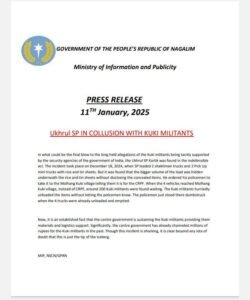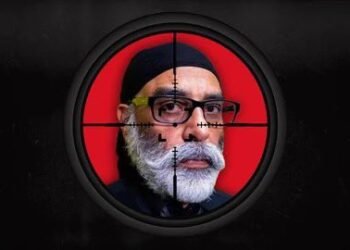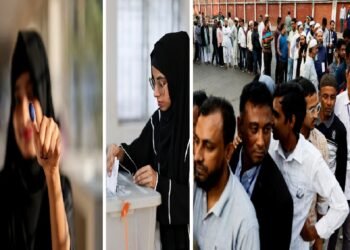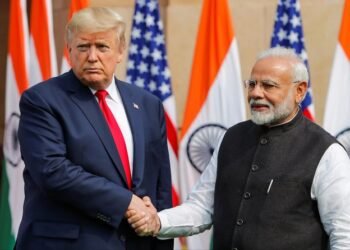The ethnic conflict in Manipur has reached new heights as the National Socialist Council of Nagaland-Isak-Muivah (NSCN-IM) showing signs of hifting its stance, breaking its neutrality and reportedly siding with the Meitei community against the Kuki-Zo groups. This move comes after an attack on a Naga woman by Kuki miscreants, further intensifying an already volatile situation marked by violence, political allegations, and growing hostility between the two communities.
BY Navin Upadhyay
The ethnic conflict in Manipur, which has been intensifying over the past few months, has taken a significant turn with the National Socialist Council of Nagaland-Isak-Muivah (NSCN-IM) becoming actively involved in the complex situation.
The NSCN(I-M) has made serious allegations against the Centre, accusing it of supplying arms to Kuki militants. Adding further tension, the recent burning of an Assam Rifles post by Tangkhul Nagas has exacerbated the situation, drawing attention to the Naga perspective in the broader ethnic conflict between the Meitei and Kuki-Zo communities.
These actions are likely to resonate with the Meitei community, which has long criticized both the state and central governments for not taking a firmer stance against the Kuki-Zo militants. The Meiteis also see the Assam Rifles as sympathetic to the Kuki-Zo groups..
On the other hand, the Kuki-Zo communities have all along taken a contrasting position, accusing the Centre of abetting the actions of Meitei militant groups and insurgents, further deepening the ethnic divide.
If this shift is not limited to isolated incidents, it could further intensify the already volatile situation, deepening the divide with violent clashes and political accusations continuing to escalate.
Background: NSCN(IM)’s Neutral Stance
For much of the conflict, the NSCN-IM, a key Naga insurgent group, had remained neutral. While it has consistently supported Naga autonomy and opposed the state government on issues related to land and cultural identity, it had refrained from publicly taking sides in the Manipur conflict. However, recent events suggest a change in this stance, with indications that the NSCN-IM is now siding with the Meitei community in their battle against the Kuki-Zo groups.
The Attack on a Naga Woman and Escalating Tensions
The immediate catalyst for this shift appears to be the reported assault of a Naga woman by a group of Kuki-Zo villagers. The attack occurred on January 7, in K Lungwiram, a Liangmai Naga village near the Leimakhong Army Cantonment in Kangpokpi district.
The woman, who was overseeing land leveling activities using an excavator, was reportedly attacked by about 20 Kuki-Zo individuals. Eyewitnesses claim the group physically assaulted the woman, threw her to the ground, and destroyed her phone. Her brother, present at the scene, corroborated her account, adding that they were verbally abused and threatened during the attack. This incident is seen as a part of the wider ethnic conflict, with Kuki-Zo groups being blamed for the violence.
Condemnation and Ultimatum
The Foothill Naga Joint Action Committee (FNJAC) condemned the assault, calling it an intentional attack on the dignity and identity of the Naga people. The FNJAC issued a 48-hour ultimatum demanding an apology from Kuki leadership and immediate action to identify and punish those responsible. The attack was seen as a direct challenge to the long-standing peaceful coexistence between the Naga and Kuki communities.
In response to the attack, the Konsakhul Naga Village Authority in Kangpokpi district issued an eviction order for residents of Leilon Kuki-Zo village. This action was taken after an alleged molestation and assault on a Naga woman in K Lungwiram, which further fueled the tensions.
The Konsakhul Village Authority condemned the actions as a violation of the mutual understanding between the two communities, stating that Kuki-Zo individuals had been engaging in anti-social activities despite being allowed to settle on Naga land as tenants. They also pointed out that the lease agreement for the settlement had expired.
The Liangmai Naga Indigenous Forum (LNIF) also weighed in, declaring that the Naga community would not tolerate provocation on their ancestral land. The LNIF rejected COTU’s interference in the land dispute, urging them to stay out of matters where they had no legitimate role. The statement emphasized that any further attacks on Liangmai Naga villages or individuals would be met with strong resistance.
COTU’s Response
In contrast, COTU (Committee on Tribal Unity), a Kuki umbrella organization, accused Naga groups of making baseless claims to stir up ethnic tensions. COTU rejected the accusations of violence, suggesting that the attack on the woman might have been an isolated incident rather than a coordinated effort. They called for a thorough investigation to uncover the truth behind the assault. However, the Naga community rejected this response, accusing COTU of hypocrisy for invoking Christian values while engaging in violence and harassment.
The LNIF strongly criticized COTU’s actions, arguing that they contradicted the Christian values they profess. The Naga forum made it clear that while the Liangmai Naga people had engaged in democratic protests, they would no longer tolerate further bullying or attacks. They warned that any future violence would be met with a firm defense of their land and identity.
Burning of Assam Rifles Outpost and Escalating Hostilities
The situation in Manipur escalated further when Thangluk Nags were involved in the burning of an Assam Rifles outpost in Ukhrul district. Videos shared on social media showed villagers, including women, marching toward the Assam Rifles post, which was eventually dismantled by the crowd. Local leader and MLA Leishiyo Keishing was seen questioning the authority of the Assam Rifles over timber collection in the region, a matter the villagers believed fell under the jurisdiction of the forest department. The burning of the outpost was seen as a response to what was perceived as the Assam Rifles’ siding with the Kuki-Zo groups, further complicating the already strained relationship between the Naga and Kuki communities.
NSCN(IM)’s Allegations Against the SP of Ukhrul
The NSCN(IM) also accused the SP of Urukhal, Maladi Kartik, of supplying arms to Kuki militants, claiming that his actions were exacerbating the conflict. In a statement on Saturday, the NSCN(IM) alleged that the SP facilitated the delivery of arms to Kuki militants in December 2024, further intensifying the violence between the communities. The claim contrasts with the accusations of Kuki groups, who allege that the central government is supporting the Meitei community in the ongoing conflict.
On 11/1/25 it was found that some media outlets were publishing a news item claiming that Ukhrul SP was aiding Kuki militants, which was based on a press release from NSCN IM. The news item and the Press release are blatantly false.
Based on a request from the BSF and Kangpokpi… pic.twitter.com/eJ2bjobLek
— Manipur Police (@manipur_police) January 12, 2025
The Manipur police has refuted the allegations against the SP and described both the allegations and the press release as “false.” However, the clarification didn’t explain whether the NSCN(IM) release itself was “fabricated”. The NSCN(IM) release was on its official letterhead.

Implications for Manipur
This shift in NSCN(IM)’s alignment marks a significant development in the ongoing conflict in Manipur, which is on the brink of further instability. The Meitei community, already caught in the crossfire of Kuki-Zo militancy and state security forces, now has the NSCN(IM) as an ally. This shift could tip the balance of power in the region, leading to more military and political tensions between the communities.
The NSCN(IM)’s break from neutrality, combined with rising allegations and violent retaliation, further complicates the already tense situation in Manipur. This shift not only risks escalating violence but also threatens to draw in additional insurgent groups and the Indian government in a prolonged conflict. If the Meitei and Naga communities continue to unite against the Kuki-Zo groups, the region could face even greater destabilization in the months ahead. Resolving this crisis will require careful diplomacy and a unified effort to restore peace and stability to the region.
.














